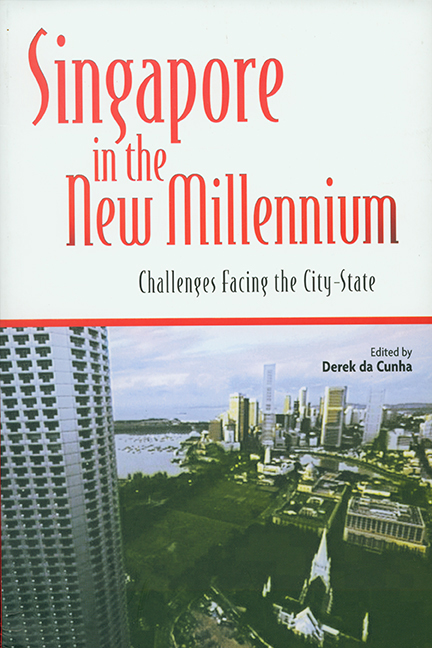Book contents
- Frontmatter
- Contents
- Preface
- Contributors
- 1 The Limits of a City-state: Or Are There?
- 2 External Challenges Facing the Economy
- 3 Governance: Its Complexity and Evolution
- 4 The Future of Civil Society: What Next?
- 5 Relating to the World: Images, Metaphors, and Analogies
- 6 Relating to the World: Images, Metaphors, and Analogies
- 7 Education in the Early 21st Century: Challenges and Dilemmas
- 8 Reframing Modernity: The Challenge of Remaking Singapore
- 9 National Identity, the Arts, and the Global City
- 10 The Media and the Flow of Information
- 11 Conclusion
- Index
8 - Reframing Modernity: The Challenge of Remaking Singapore
Published online by Cambridge University Press: 21 October 2015
- Frontmatter
- Contents
- Preface
- Contributors
- 1 The Limits of a City-state: Or Are There?
- 2 External Challenges Facing the Economy
- 3 Governance: Its Complexity and Evolution
- 4 The Future of Civil Society: What Next?
- 5 Relating to the World: Images, Metaphors, and Analogies
- 6 Relating to the World: Images, Metaphors, and Analogies
- 7 Education in the Early 21st Century: Challenges and Dilemmas
- 8 Reframing Modernity: The Challenge of Remaking Singapore
- 9 National Identity, the Arts, and the Global City
- 10 The Media and the Flow of Information
- 11 Conclusion
- Index
Summary
It is notoriously difficult to grapple with a subject such as the challenge posed by modernity. It is a rather large and slippery subject, as the bewildering array of interpretations on the meaning of the terms, “modernity”, “modern”, and “modernization” guarantees that the battle to make sense of the conceptual map is lost before it even begins. But, as the linguist Alfred Korzybski pointed out, since the map is not the territory, I shall carve out the relevant terrain of discussion.
Broadly, the chapter begins by examining modernity and its derivatives, and then uses the insights gleaned from this examination to study the implications of “Western” modernity for non-Western societies such as Singapore. It argues that Singapore is redefining modernity in keeping with its own “historical moment” and, through the Government's present policy initiatives, is engaged in the process of negotiating with both the dilemmas of modernization and the paradoxes of post-industrial society as it moves into the new millennium. The chapter then considers a few aspects of how Singapore has thus far responded to the challenges posed by modernity in its bid to be a city of the future.
Introduction
It was Marshall McLuhan who once proclaimed, in the electric age, that we live in a shrinking world, coining that most useful, if now banal, phrase, “the global village”. No doubt, at the turn of the twentieth century, our world displays a rich welter of diverse, often conflicting, strands and tendencies; yet, beneath the turbulent panorama of world wars, Cold War, regional wars, and North-South conflicts, a dominant trend or undercurrent can readily be detected: the process of globalization, the emergence of a “global city”.1 Occasionally deflected and sometimes nearly eclipsed by the din of armed struggle, this strand has the earmarkings of a relentless and near-providential force: seemingly disconnected events or episodes appear to coalesce almost mysteriously or fortuitously into a larger design.
However, although powerfully pervasive, this trend is not entirely self-propelled or akin to a natural force majeure: overtly or covertly, its movement is backed up by political and economic strategies as well as intellectual trajectories of long-standing.
- Type
- Chapter
- Information
- Singapore in the New MillenniumChallenges Facing the City-State, pp. 187 - 220Publisher: ISEAS–Yusof Ishak InstitutePrint publication year: 2002

